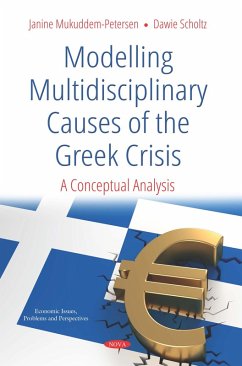The ongoing Greek crisis has been the subject of immense scholarly interest and debate since it erupted in 2009. Vast amounts of research from a number of disciplines have attempted to explain the causes of the crisis, with a great variety of approaches adopted in doing so. Unfortunately, there has been little effort to develop a comprehensive cross-disciplinary framework for understanding how the crisis came about. This study has 'bridged the divide' by developing such a cross-disciplinary conceptual model for the causes of the Greek crisis. The literature review process revealed that studies from the political science, public administration, economics, financial economics and monetary economics disciplines contained a range of explanations for the occurrence of the Greek crisis. Qualitative content analysis techniques were used to synthesise the findings from these five fields into a cross-disciplinary conceptual model. By integrating the findings from the five disciplines above, a number of new insights were generated. Firstly, it was found that the crisis manifested primarily as a collapse of confidence in the ability of the Greek state to pay its debts. Secondly, that high sovereign debt levels, internal political opposition to reform, a deterioration of competitiveness of the Greek economy, the existence of destructive political institutions and the possibility of an exit from the European Monetary Union acted as key causes (amongst others) for the collapse of confidence in Greek sovereign bonds. Finally, a number of implications for policy makers in Greece and elsewhere were found and elaborated upon.
Dieser Download kann aus rechtlichen Gründen nur mit Rechnungsadresse in A, B, BG, CY, CZ, D, DK, EW, E, FIN, F, GR, HR, H, IRL, I, LT, L, LR, M, NL, PL, P, R, S, SLO, SK ausgeliefert werden.









